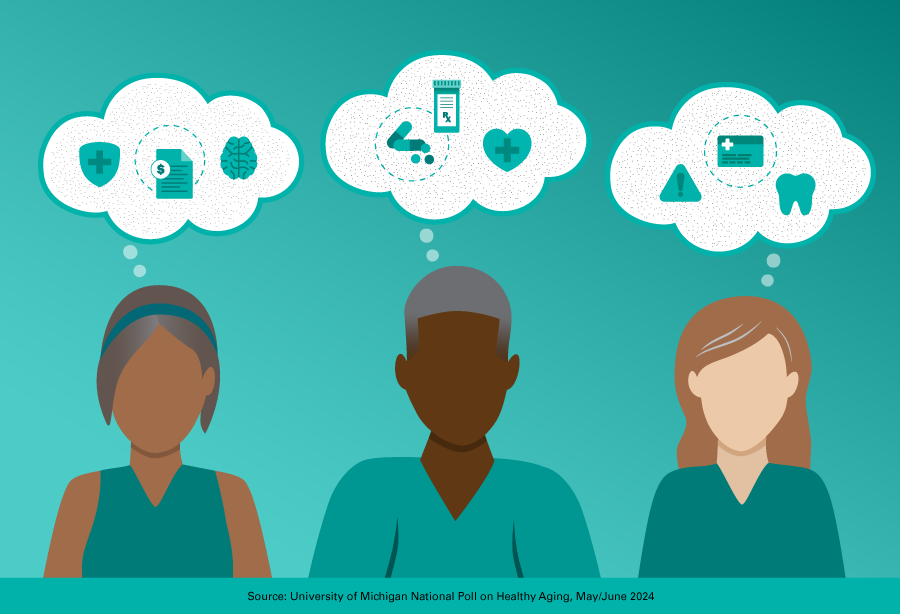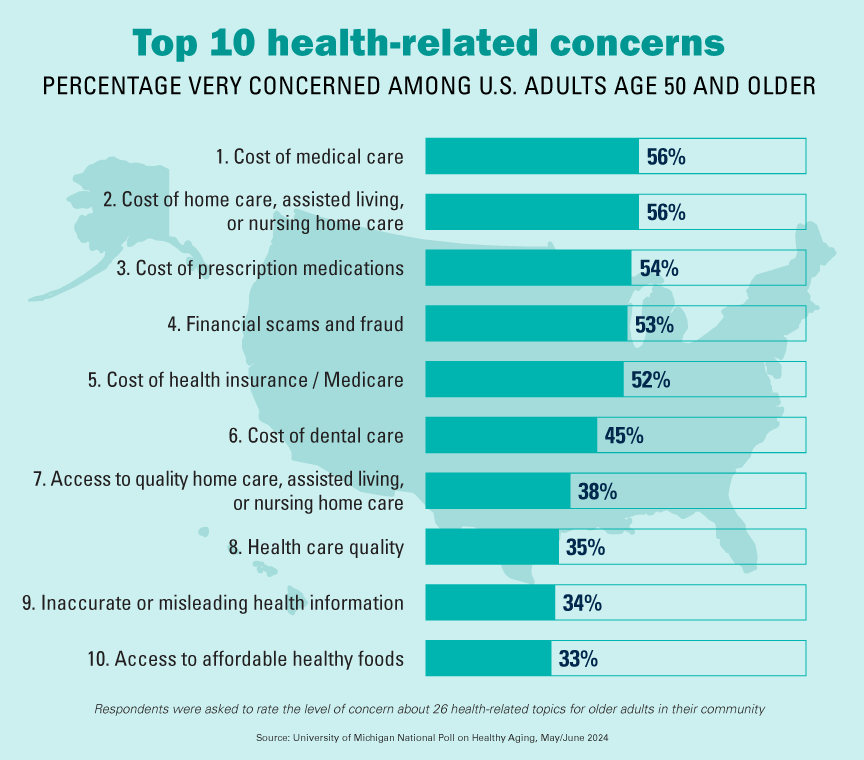
Key Findings
The health-related issues poll respondents were most commonly very concerned about for older adults in their communities included: cost of medical care (56%), cost of home care, assisted living, or nursing home care (56%), and cost of prescription medications (54%).
Women were more likely than men to be very concerned about financial scams and fraud (59% vs. 47%) for older adults in their communities.
Discrimination by age was very concerning for 42% of Black, 32% of Hispanic, and 18% of White older adults.
How concerned are older adults about access to affordable, high-quality health care? Discrimination by age or race? Substance use, anxiety, and safe and healthy neighborhoods? In February and March 2024, the University of Michigan National Poll on Healthy Aging asked a national sample of adults age 50 and older to rate their level of concern (very concerned, somewhat concerned, or not concerned) about 26 health-related issues for older adults in their communities.
Health care costs top the list of concerns
The top three issues about which respondents said they were very concerned for older adults in their communities included the cost of medical care (56%), cost of home care, assisted living, or nursing home care (56%), and cost of prescription medications (54%). Next were financial scams and fraud (53%), cost of health insurance/Medicare (52%), and cost of dental care (45%), followed by access to quality home care, assisted living, or nursing home care (38%), health care quality (35%), inaccurate or misleading health information (34%), and access to affordable healthy foods (33%).
The following issues fell just outside the top 10 based on the percentage reporting being very concerned for older adults in their community: poverty (32%), access to quality mental health care (30%), social isolation and loneliness (28%), being able to age in place (28%), unequal access to health care (28%), neighborhood safety (25%), obesity (24%), ageism or age discrimination (23%), stress and anxiety (23%), and opioid or fentanyl use (22%).
Fewer respondents were very concerned about vaccine hesitancy (21%), racial and ethnic discrimination (20%), health risks from polluted water and air (20%), access to social and recreational activities (16%), alcohol use (12%), and cannabis use (11%).

Consistent concerns about cost-related issues
Not only did concerns about the costs of health care and about financial scams and fraud represent the top six concerns among all respondents, but these topics were in the top six regardless of gender, age, race/ethnicity, level of education, income, political ideology, and geography.
Racial/ethnic differences
Concerns about some issues for older adults in their communities varied substantially across racial and ethnic groups. For example, discrimination by race or ethnicity was very concerning for 50% of Black, 26% of Hispanic, and 15% of White older adults, while discrimination by age was very concerning for 42% of Black, 32% of Hispanic, and 18% of White older adults.
Meanwhile, 46% of Black, 37% of Hispanic, and 23% of White older adults were very concerned about unequal access to health care, while access to quality mental health care was very concerning for 43% of Black, 36% of Hispanic, and 27% of White older adults.
Gender differences
Women were more likely than men to be very concerned for older adults in their communities about financial scams and fraud (59% vs. 47%), the cost of dental care (49% vs. 39%), access to quality home care, assisted living, or nursing home care (44% vs. 32%), health care quality (40% vs. 29%), poverty (39% vs. 25%), social isolation and loneliness (34% vs. 22%), ability to age in place (33% vs. 22%), and unequal access to health care (33% vs. 22%).
Age differences
Those age 50–64 were more likely than those age 65 and older to be very concerned for older adults in their communities about the cost of health insurance/Medicare (56% vs 47%), access to quality home care, assisted living, or nursing home care (41% vs. 35%), affordable healthy foods (37% vs. 27%), poverty (36% vs. 28%), social isolation and loneliness (32% vs. 24%), and unequal access to health care (31% vs. 24%).
Concerns by household income
Household income level did not significantly affect respondents’ level of concern for older adults in their communities about any of the issues related to health care costs and access, except for dental costs. Those with household incomes less than $60,000 were more likely to be very concerned about the cost of dental care compared to those with annual incomes of $60,000 or more (49% vs 40%).
Implications
These poll findings make very clear that the costs of health care and risk of financial scams and fraud weigh heavily on the minds of adults age 50 and older. Among the 26 topics that respondents were asked about, those topics comprised the top six concerns across a wide range of demographic groups.
Also notable were the issues that did not emerge as respondents’ top concerns for older adults in their communities, including more traditional public health issues such as neighborhood safety, poverty, obesity, vaccine hesitancy, health risks from polluted water or air, and access to social and recreational activities, along with concerns about the use of opioids or fentanyl, alcohol, or cannabis.
These findings indicate that efforts to contain health care costs by federal and state government leaders and health care organizations will remain a top priority for older adults. Health care professionals should be equipped to counsel older adults about their health care expenses and guide them on ways to potentially reduce their health care costs. Programs serving older adults and their families, such as the State Health Insurance Assistance Programs (SHIPs), can offer information and resources to help people navigate their health insurance options and may also help to save money on health care expenses.
Data Source and Methods
This National Poll on Healthy Aging report presents findings from a national household survey conducted exclusively by NORC at the University of Chicago for the University of Michigan’s Institute for Healthcare Policy and Innovation. This survey module was administered online and by phone from February 22nd–March 12th, 2024, to a randomly selected, stratified group of U.S. adults age 50–101 (n=3,379), with an oversample of non-Hispanic Black and Hispanic populations. The survey completion rate was 44% among panel members invited to participate. The margin of error is +/- 1 to 4 percentage points for questions asked of the full sample and higher among subgroups.
Findings from the National Poll on Healthy Aging do not represent the opinions of the University of Michigan. The University of Michigan reserves all rights over this material.
Read other National Poll on Healthy Aging reports and about our Michigan findings, and learn about the poll methodology.
For interactive data tables, see https://michmed.org/Kkde7.
Citation
Ayanian, J, Hutchens L, Singer D, Solway E, Kirch M, Box N, Roberts S, Smith E, Kullgren J. On Their Minds: Older Adults’ Top Health-Related Concerns. University of Michigan National Poll on Healthy Aging. May/June 2024. Available at https://dx.doi.org/10.7302/22628
Scholarly Publication
Ayanian JZ, Kirch M, Singer DC, et al. Leading Health-Related Concerns of Older Adults Before the 2024 Election. JAMA. Published online August 14, 2024. doi:10.1001/jama.2024.14353